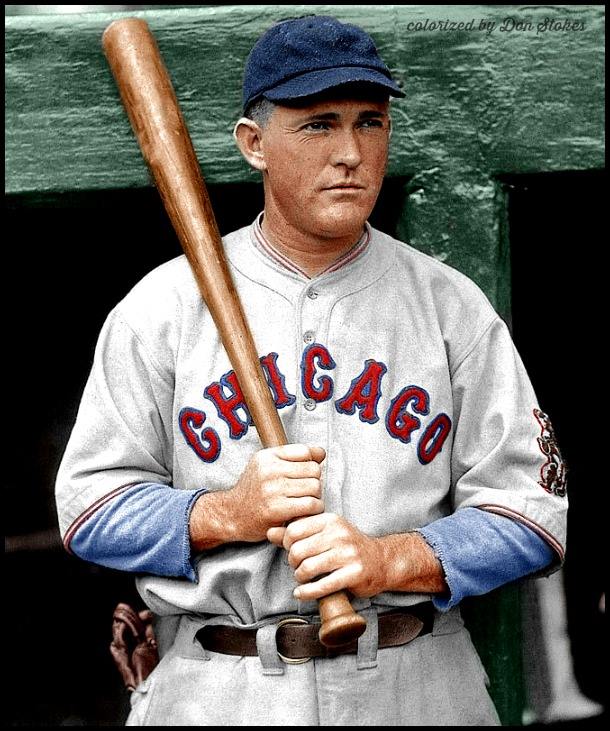Rogers Hornsby Photo Gallery
Click on any image below to see photos in full size and to start Photo Gallery:
Rogers Hornsby Traded Again!
“He was frank to the point of being cruel and was as subtle as a belch.” – Sportswriter Lee Allen, speaking of Rogers Hornsby
“Hiring Rogers Hornsby to manage the Cubs was the worst mistake I made in all my years in baseball.” -William Veeck, Sr. Cub President (paraphrase)
“Nobody liked our manager Rogers Hornsby. There was a real pr**k. Except for his racing forms, there was no newspapers, no movies, no beer, nothing. Women and horses, that was his downfall.” – St. Louis Browns pitcher Les Tietje
In what soon became a recurring pattern, Rogers Hornsby was traded by the Giants to the Braves 89 years ago yesterday, January 10, 1928. This was was the second in a series of trades between 1926 and 1930 involving Hornsby. He was moved from the Cardinals to the Giants to the Braves and to the Cubs, as owners sooner-or-later came to view Hornsby as a detriment to their team.
The previous year, 1927, Hornsby was traded from the Cardinals to the Giants in a trade of superstars that rocked the baseball world. John McGraw had long coveted Hornsby, and was willing to pay a steep price: star second baseman Frankie Frisch, plus journeyman pitcher Jimmy Ring. It was a trade McGraw soon came to regret. Hornsby lasted only one year in New York, while Frisch led the Cardinals to four pennants and two World Series championships over the next eight seasons. By the end of the 1927 season, Giants’ owner Charles Stoneham was fed up with Hornsby’s abrasive style, contract demands, and gambling habits – character flaws that stayed with him for his entire career – and unloaded him to the Boston Braves.
Rogers Hornsby’s personality was so tactless and abrasive that he was released as manager of the Cardinals during the off-season shortly after winning the 1926 World Series. It probably didn’t help his cause that he once kicked owner Sam Breadon out of the Cardinals’ clubhouse. Likewise, he was dismissed as manager of the Cubs in August of 1932 while the Cubs were in first place. Milking his 1926 World Series victory for all it was worth, Hornsby was still managing baseball clubs at the major and minor league levels as late as the 1952, with owners usually coming to regret the day they hired him. He finished his managerial career with a rather dismal 701-812 (.463) record.
Rogers Hornsby may have been abrasive and tactless, but “Rajah” could hit and was unquestionably one of the best offensive players of all time. Over his 23-year major league career, in which he played for the Cardinals (1915–1926, 1933), Giants (1927), Braves (1928), Cubs (1929–1932), and Browns (1933–1937), he posted a .358 life-time batting average, second only to Ty Cobb’s .367. Hornsby compiled 2,930 hits, 1579 runs, 541 doubles, 301 home runs, 1584 RBIs, .434 on-base percentage, .577 slugging average, and batted .400 or more three times.
Hornsby was a two-time National League Most Valuable Player, a two-time Triple Crown winner, a seven-time National League batting champion, a two-time home run champion, and a four-time RBI champion. He led the league in doubles four times, runs five times, on-base percentage nine times, slugging average nine times, and total bases seven times. His career OPS+ of 175 places him among the game’s all-time greats (100 is the major league average).
Hornsby hit more home runs, drove in more runs, and had a higher batting average than any other National League player during the 1920s, which makes him one of only four players to win a “Decade Triple Crown.” He was also a consistent hitter at home and on the road, averaging .359 at home and .358 on the road. In his prime, Hornsby was renowned for his speed, and was considered the fastest player in the National League.
Was Rogers Hornsby’s 1922 season the greatest ever? You’d be hard pressed to find a better individual year. Hornsby led the league in all major offensive categories, including batting average (.401), hits (250), runs (141), home runs (42), RBIs (152), doubles (46), OBP (.459), total bases (450), and slugging percentage (.722), setting records in many of these categories. He became the only player in major league history to hit over 40 home runs and bat over .400 in the same season. From August 13 through September 19, he had a 33-game hitting streak. On defense, Hornsby led all second basemen in putouts, double plays, and fielding percentage.
Hornsby’s five-year span from 1921-1925 may be the greatest five-year offensive display in baseball history. During this span, he averaged each year .401 BA, 215 hits, 123 runs, 28 home runs, 120 RBIs, 41 doubles, .474 on-base percentage, .688 slugging average, and 370 total bases. His 203 OPS+ during this span is “off the charts.”
By 1926, Hornsby slipped a bit as his average “fell” to a mere .317. But he managed the Cardinals to the 1926 pennant and also to victory in the 1926 World Series, considered one of the classics. It’s remembered for Hornsby summonsing a hung-over Pete Alexander from the bullpen in the seventh inning of the seventh game. “Old Pete” proceeded to strike out Tony Lazzeri with the bases loaded and held the Yankees in check to close out the series for the Cardinals.
Rogers Hornsby was named to the Major League Baseball All-Century and All-Time teams. He was elected to the Hall of Fame in 1942.
-Gary Livacari
Photo credits: All found in Google search; Rogers Hornsby colorization in gallery by Don Stokes https://www.facebook.com/Don-Stokes-Old-Time-Baseball-Colorizations-923346241033508/?fref=ts
Information: Excerpts edited from the Rogers Hornsby Wikipedia page. Read more at:https://en.wikipedia.org/
Statistics from Rogers Hornsby page on Baseball-Reference.com

